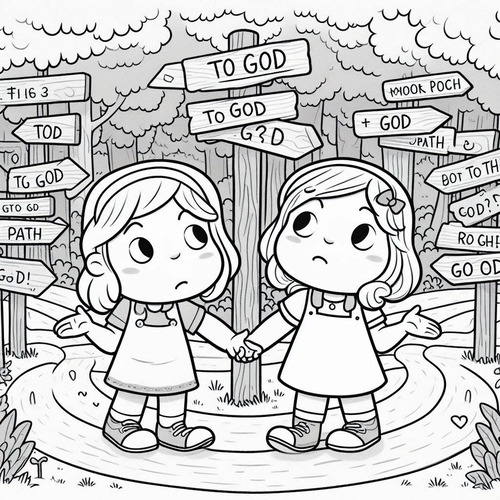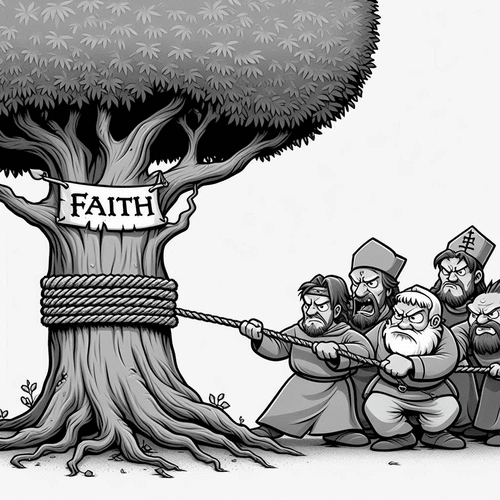Spiritual Conviction in a Pluralistic World: Beyond Indifference
WHY HAVE SPIRITUAL CONVICTION IN A PLURALISTIC WORLD? In today’s increasingly pluralistic world, a common attitude gaining traction is one of apathy and “indifferentism” towards religious truth claims. Apathy is a state of disinterest or lack of concern, particularly towards matters of importance or significance. Indifferentism, in the context of religion, is the belief that all religions are equally valid paths to spiritual truth or salvation. Together, these attitudes can lead to a passive acceptance of all religious claims without critical examination or personal conviction. This view essentially argues that all faith traditions are equally valid paths to the divine or spiritual enlightenment. As such, it becomes unnecessary or even arrogant to assert any one religion’s tenets as objectively superior or more authoritative than others. While religious pluralism rightly calls for mutual respect across faith communities, indifferentism represents an overcorrection that fails to grapple with religions’ substantive disagreements on essential spiritual matters. When clung to as a philosophical principle, it reveals several logical inconsistencies and issues:
The Law of Non-Contradiction Ancient philosophers, including Aristotle highlighted the foundational law of non-contradiction—that opposite truth claims cannot both be valid at the same time. The world’s major faiths make mutually exclusive assertions about the nature of God or Ultimate Reality, the human condition’s fundamental issue, and the means of achieving salvation or spiritual liberation. These contradictory truth claims cannot all be equally true by definition. Indifferentism avoids this philosophical tension rather than reasoning through it.
Adopting an approach of apathy and indifference towards religions is, in essence, a form of disrespect to all faiths. This is because each religion carries its own unique and vital truths, and to be indifferent is to dismiss these profound differences and the rich tapestry of beliefs they represent.
Profound and Exclusive Truth Claims At their core, authentic religions do not offer multiple cosmetic expressions of the same vague higher truths. Rather, they forward comprehensive, radical perspectives that redefine the totality of human existence and urgently demand total conviction. The very premises of pivotal faiths like Christianity and Buddhism rest on exclusive truth claims about God, human nature, and the path to enlightenment that clearly contradict one another on an intellectual level.
The Trap of Moral Relativism Indifferentism tacitly reduces all spiritual and moral truths to culturally subjective preferences, devolving into a relative morass. If all belief systems are equally valid perspectives, there can ultimately be no objective ethical foundation or moral accountability across humanity’s diverse contexts. The guidance systems of scriptures and faith traditions are undermined, resulting in societal fragmentation.
SPIRITUAL CONVICTION IN A PLURALISTIC WORLD: The Imperative of Honest Conviction A fair evaluation of religions is necessary for an authentic conviction in one’s examined beliefs. Simply dismissing or assigning equal merit to all faith positions reflects an intellectual laziness unbecoming of sincere religious reflection and the ramifications it holds for deriving life’s meaning and ethical foundations.
A Call to Thoughtful Pluralism Rather than apathy, the most coherent stance is to align with pluralistic engagement—respecting faith diversity while thoughtfully examining each worldview’s claims, reasoning through points of intersection and divergence, and ultimately embracing sincere conviction in one’s systematized beliefs.
For those convinced of Christianity’s truth, it provides a distinctive vision of ultimate reality centred on the theistic God’s saving work through Jesus Christ—not one path among many equal options, but the culmination of divine revelation and redemption for all peoples. While advocating this hope sensitively and winsomely, Christians resist apathetic pluralism and forthrightly uphold spiritual conviction’s vital role for every human soul.
References: Kreeft, P. (1994). Christianity for Modern Pagans: Pascal’s Pensées Edited, Outlined, and Explained. Ignatius Press. : Newbigin, L. (1989). The Gospel in a Pluralist Society. SPCK. : Hick, J. (2004). An Interpretation of Religion: Human Responses to the Transcendent. Yale University Press.
Editor's Pick

‘Flee Sexual Sin’: Why Does Paul Single This Sin Out?
When the apostle Paul writes to the Corinthian church, he doesn’t tell them to simply avoid sexual immorality or resist [...]

Does Denying God’s Sovereignty Mean Denying the Gospel?
RC Sproul once warned denying God’s sovereignty “eviscerates” grace—a strong word meaning to gut or disembowel something, leaving only an [...]

Why Christians Fast: The Biblical Discipline’s Very Real Rewards
Why would Christians, who rejoice in the good gifts of food and fellowship, deliberately choose to go without? Isn’t fasting [...]

The Christian Sabbath: Why Did Sunday Replace Saturday?
Consider this: God-fearing Jews who’d faithfully observed Saturday Sabbath for over a thousand years suddenly began gathering for worship on [...]

Did the Early Christians Worship Jesus? The Biblical Evidence
It was a startling transformation: Jewish fishermen who'd spent three years following this itinerant carpenter from Nazareth now begin to [...]

If Jesus is Messiah, Why Aren’t ALL Messianic Prophecies Fulfilled?
If Jesus is truly the Messiah, why hasn't world peace arrived? Why do Jews still face persecution? Why isn't the [...]

When Courage Fails: Will I Be Forgiven If I Deny Christ in Persecution?
The rooster crowed, and Peter remembered. In that devastating moment, the apostle realised he’d just done the unthinkable—three times he’d [...]

What Makes a Godly Dad? 5 Biblical Principles Fathers Need
Modern culture sends fathers mixed messages. Be strong but sensitive. Be involved but not overbearing. Lead but don’t dominate. With [...]

What Makes a Godly Mom? A Scripture-Backed Guide
In our culture’s confusion about gender roles and parenting, the timeless question remains: what makes a godly mother? While secular [...]

Paul’s Mandate for Men: Headship Or Servant Leadership? Or Both?
Modern Christianity has fallen into a trap. We've created an either/or battle between "headship" and "servant leadership," as if these [...]
SUPPORT US:
Feel the Holy Spirit's gentle nudge to partner with us?
Donate Online:
Account Name: TRUTHS TO DIE FOR FOUNDATION
Account Number: 10243565459
Bank IFSC: IDFB0043391
Bank Name: IDFC FIRST BANK






